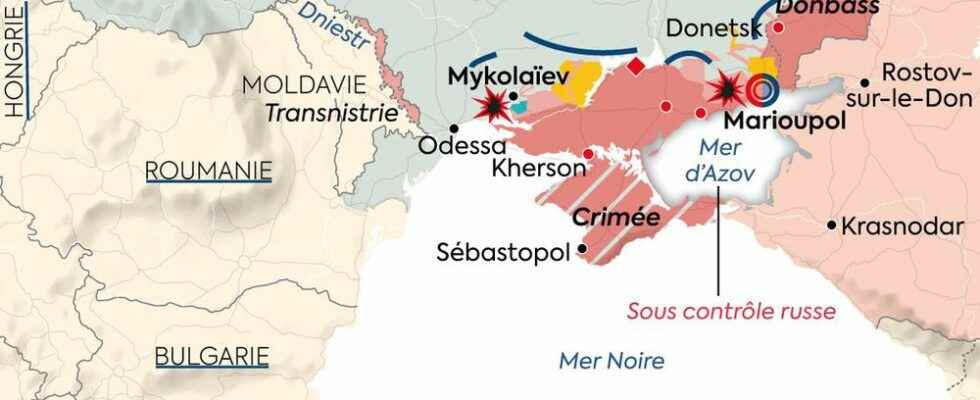A first bright spot in the Russian-Ukrainian talks, but not yet the end of the war. After a new salvo of discussions, Tuesday, March 29 in Istanbul, the negotiators of the two countries welcomed “substantial” progress. A sign of the times, diplomats even mentioned a possible meeting between Volodymyr Zelensky and Vladimir Putin to find a way out of the conflict. Earlier in the day, the Russian Deputy Minister of Defense had indicated that Moscow would “radically reduce its military activity in the direction of kyiv and Cherniguiv”, in the north of the country, to “increase confidence” around a possible “agreement on the neutrality and non-nuclear status of Ukraine”, two key demands of Moscow.
However, a way out of the crisis still seems far away at this stage. “The reduction of the Russian military presence in northern Ukraine – even if it remains to be confirmed – would be a step forward. But for the moment, the fighting continues to rage in the east and the south of the country”, points out Carole Grimaud Potter, founder of the Center for Russia and Eastern Europe Research, based in Geneva. Similarly, kyiv always makes the complete withdrawal of Russian troops from its territory a prerequisite for the signing of any agreement. This raises the question of the future of the territorial gains conquered by Moscow since the beginning of the conflict.
The question of Russian territorial gains
“No matter how much territory Russia will eventually have under its control, one can assume that it will not wish to return it to Ukraine. In the same way, one can assume that Ukraine will not wish recognize Russian sovereignty over them, believes Marie Dumoulin, former diplomat and director of the Wider Europe program at the European Council for Foreign Relations (ECFR).The question of Russian territorial gains since February 24 will therefore be a point of tension important in the ongoing negotiations.”
The Express
For their part, Washington and London have not hidden their skepticism with regard to progress in the talks between Moscow and kyiv. “I haven’t seen anything to suggest there’s a real movement because we haven’t seen any signs of real seriousness from Russia,” US Secretary of State Antony Blinken said in a statement. the stride. “There is what Russia says and what Russia does. We focus on what it does,” he nuanced, adding that the Ukrainians are negotiating with “literally a gun to their heads.”
On Sunday, the head of Ukrainian military intelligence, General Kyrylo Budanov, said that Moscow would consider “a Korean scenario for Ukraine”, aimed at “imposing a line of division between the unoccupied and occupied regions”. After three years of war between the two Koreas between 1950 and 1953, the signing of an armistice put an end to hostilities and sealed the division of the peninsula into two separate countries. The creation, at the time, of a demilitarized zone 248 kilometers long and four kilometers wide, following the old front line at the level of the 38th parallel north, has since fixed the border between North Korea and the South Korea.
Russian concentration in eastern Ukraine
“A partition of Ukraine could lead to the creation of a pro-Russian zone, whose status remains to be defined, in the east and in the south of the country, allowing Moscow in particular to have a land corridor between the Donbass and Crimea. In the west of the country, one could imagine a neutral and partially demilitarized zone, which would keep kyiv as its capital and be under the control of Zelensky’s government, draws up Carole Grimaud Potter. We can imagine that Russia will continue to put military pressure on Ukraine to cede more territory.”
Moscow had already announced Friday to reduce its ambitions in the North to “concentrate the bulk of the efforts on the main objective: the liberation of Donbass”. In this region, two pro-Russian separatist republics – recognized by Moscow – have been fighting Ukrainian forces since 2014. “The occupiers will try to unite the occupied territories into a single quasi-state entity, which will oppose independent Ukraine. We are already witnessing attempts to create parallel authorities in the occupied territories, which force people to give up the Ukrainian currency”, draws up the Ukrainian intelligence.
Regarding the Donbass issue specifically, the leader of the pro-Russian separatist territory of Lugansk has announced that he may soon hold a referendum aimed at joining Russia. A threat that is reminiscent of the Crimean precedent. In 2014, the peninsula declared its independence after being invaded by Russian forces, then attached to Russia following a referendum not recognized by the international community.
